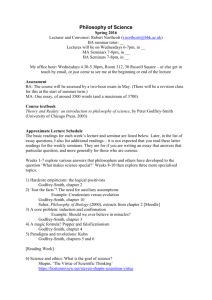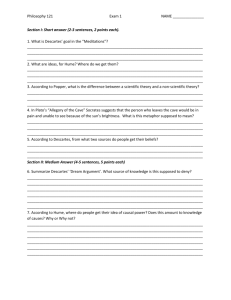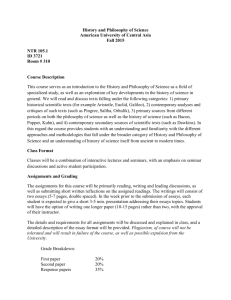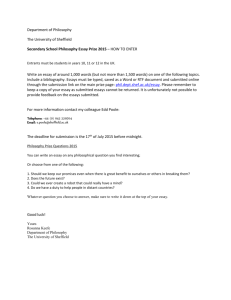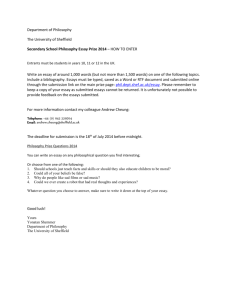Philosophy of Science
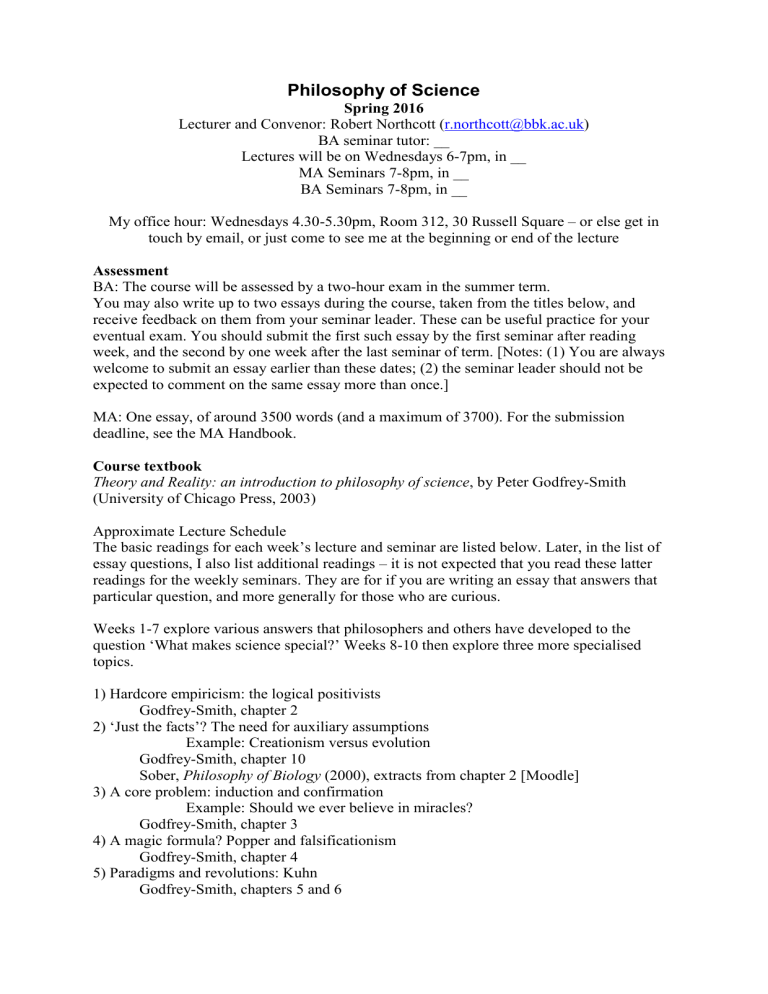
Philosophy of Science
Spring 2016
Lecturer and Convenor: Robert Northcott ( r.northcott@bbk.ac.uk
)
BA seminar tutor: __
Lectures will be on Wednesdays 6-7pm, in __
MA Seminars 7-8pm, in __
BA Seminars 7-8pm, in __
My office hour: Wednesdays 4.30-5.30pm, Room 312, 30 Russell Square – or else get in touch by email, or just come to see me at the beginning or end of the lecture
Assessment
BA: The course will be assessed by a two-hour exam in the summer term.
You may also write up to two essays during the course, taken from the titles below, and receive feedback on them from your seminar leader. These can be useful practice for your eventual exam. You should submit the first such essay by the first seminar after reading week, and the second by one week after the last seminar of term. [Notes: (1) You are always welcome to submit an essay earlier than these dates; (2) the seminar leader should not be expected to comment on the same essay more than once.]
MA: One essay, of around 3500 words (and a maximum of 3700). For the submission deadline, see the MA Handbook.
Course textbook
Theory and Reality: an introduction to philosophy of science , by Peter Godfrey-Smith
(University of Chicago Press, 2003)
Approximate Lecture Schedule
The basic readings for each week’s lecture and seminar are listed below. Later, in the list of essay questions, I also list additional readings – it is not expected that you read these latter readings for the weekly seminars. They are for if you are writing an essay that answers that particular question, and more generally for those who are curious.
Weeks 1-7 explore various answers that philosophers and others have developed to the question ‘What makes science special?’ Weeks 8-10 then explore three more specialised topics.
1) Hardcore empiricism: the logical positivists
Godfrey-Smith, chapter 2
2) ‘Just the facts’? The need for auxiliary assumptions
Example: Creationism versus evolution
Godfrey-Smith, chapter 10
Sober, Philosophy of Biology (2000), extracts from chapter 2 [Moodle]
3) A core problem: induction and confirmation
Example: Should we ever believe in miracles?
Godfrey-Smith, chapter 3
4) A magic formula? Popper and falsificationism
Godfrey-Smith, chapter 4
5) Paradigms and revolutions: Kuhn
Godfrey-Smith, chapters 5 and 6
[Reading Week]
6) Science and ethics: What is the goal of science?
Shapin, ‘The Virtue of Scientific Thinking’ https://bostonreview.net/steven-shapin-scientism-virtue
7) Science as a social institution. Why was modern science a Western thing?
Godfrey-Smith, chapter 8, sections 8.1 and 8.2
Diamond, ‘Why did human history unfold differently on different continents for the last 13,000 years?’ [Moodle]
8) Scientific Explanation: what makes an explanation scientific?
Godfrey-Smith, chapter 13
9) Does science give us the truth? The debate over scientific realism
Godfrey-Smith, chapter 12
10) Scientific Progress
Northcott, ‘Verisimilitude: a causal approach’ [Moodle]
Niiniluoto, ‘Verisimilitude: the third period’ [Moodle]
Essay Questions
Most readings are on the course’s Moodle site, or else freely available online at the cited
URLs. For legal reasons, exceptions are most of the Godfrey-Smith chapters, and also the full
Kuhn book. I have added annotations in double brackets.
1) What problems arose with the logical positivists’ view of science?
Godfrey-Smith, chapters 2, 3 and 10
Moritz Schlick (1932), ‘Positivism and realism’
((a positivist manifesto from the movement’s revolutionary early days))
Willard V.O. Quine (1951), ‘Two Dogmas of Empiricism’
((the classic critique of the positivist programme))
Nelson Goodman (1955), Fact, Fiction and Forecast , chapter 3
((the original presentation of the grue paradox – which starts on p72))
2) What is Popper’s view of scientific method? Is that view satisfactory?
Godfrey-Smith, chapter 4
Karl Popper, Objective Knowledge (1979), especially chapter 1
((Popper’s position in his own words – and in his own characteristic style))
http://plato.stanford.edu/entries/popper/ - especially section 9
Wesley Salmon (1981), ‘Rational prediction’,
British Journal for the Philosophy of Science 32, 115-125.
((critically discusses Popper’s views on induction))
Paul Schilpp (ed), The Philosophy of Karl Popper (1974, Open Court)
((a collection of essays about Popper from many different points of view))
(See also: Quine ‘Two Dogmas’ from Essay 1, whose arguments for holistic testing tell against Popper’s falsificationism as well as against logical positivism.)
(See also: Kuhn’s account of normal science, which tells against Popper’s extreme critical attitude to scientific theories.)
3) In what sense, if any, does Kuhn show that paradigm change in science is irrational?
Godfrey-Smith, chapters 5, 6
Thomas Kuhn (1970), The Structure of Scientific Revolutions , especially chapters
9 and 10
((Kuhn’s magnum opus ; chapter 9 covers revolutions, and chapter 10 the incommensurability thesis))
Stephen Toulmin (1970), “Does the distinction between normal and revolutionary science hold water?”, in Lakatos and Musgrave (eds),
Criticism and the Growth of
Knowledge , 39–47
((the second half of this is the interesting bit for our purposes))
Alexander Bird, ‘Thomas Kuhn’, Stanford Encyclopedia of Philosophy , http://plato.stanford.edu/entries/thomas-kuhn/ – especially sections 4 and 6.2
((useful summary of Kuhn’s work; section 4 covers Kuhn’s incommensurability claims, and section 6.2 some critical responses to it))
Jim Bogen, ‘Theory and Observation in Science’, Stanford Encyclopedia of
Philosophy , http://plato.stanford.edu/entries/science-theory-observation/
((some background on the theory-observation distinction))
4) What is the best account of scientific explanation?
Godfrey-Smith, chapter 13
James Woodward, ‘Scientific Explanation’,
Stanford Encyclopedia of Philosophy http://plato.stanford.edu/entries/scientific-explanation/
((comprehensive survey by one of the current leaders in the field))
Judea Pearl, ‘The Art and Science of Cause and Effect’ public lecture (1996) http://singapore.cs.ucla.edu/LECTURE/lecture_sec1.htm
((an intuitive, easy-to-follow introduction to the basic ideas behind a manipulability account of causal explanation – i.e. the account that Woodward has developed into the most influential current view))
James Woodward (2000) ‘Explanation and Invariance in the Special Sciences’,
British Journal of Philosophy of Science , pp. 197-254
((a more detailed and technical exposition of Woodward’s account))
Carl Hempel (1966), ‘Laws and their role in scientific explanation’, Philosophy of
Natural Science , pp. 47-69
((presentation of the deductive-nomological model by the famous positivist))
Wesley Salmon (1984), Scientific Explanation and The Causal Structure of the
World , pp. 3-20
5) Do scientific theories give us the literal truth, or are they merely useful instruments for making predictions?
Godfrey-Smith, chapter 12
Larry Laudan (1981), ‘A confutation of convergent realism’, Philosophy of
Science
((a classic anti-realist piece))
Nancy Cartwright (1980), ‘The reality of causes in a world of instrumental laws’,
PSA: Proceedings of the Biennial Meeting of the Philosophy of Science
Association , Vol. 1980, Volume Two: Symposia and Invited Papers (1980), pp.
38-48 http://www.jstor.org/discover/10.2307/192585?sid=21105467941853&uid=2&uid
=3738032&uid=70&uid=4&uid=2129
(See also Cartwright (1994), ‘Fundamentalism versus the patchwork of laws’
Proceedings of the Aristotelean Society 94:279-292 http://www.jstor.org/stable/10.2307/4545199 )
John Worrall (1989), ‘Structural realism: the best of both worlds?’ Dialectica
((two of the more influential recent versions of realism – Cartwright defends realism about entities’ causal powers, even while being instrumentalist about laws; Worrall defends realism about the structural relations that laws describe, even while being instrumentalist about the ontology they appeal to))
Richard Boyd (1991), ‘On the Current Status of Scientific Realism’, in R. Boyd,
P. Gasper and J. D. Trout, The Philosophy of Science
((a more traditional realist piece))
Bas Van Fraassen (1980), The Scientific Image , pp. 1-25
((advocate of ‘constructive empiricism’, probably the most influential recent instrumentalist view))
6) In what sense, if any, can science be said to be getting closer to the truth?
David Miller (1974), ‘Popper's Qualitative Theory of Verisimilitude’, British
Journal for the Philosophy of Science 25 , pp. 166-77.
((classic presentation of the language-dependence difficulty for theories of approximate truth – the key example is in the final two pages))
Robert Northcott (2013): ‘Verisimilitude: a causal approach’, Synthese 190 , pp.
1471-1488
((my own take on the notion of approximate truth, and whether it can be applied to scientific theories))
Ilkka Niiniluoto (1998), ‘Verisimilitude: the third period’, British Journal for the
Philosophy of Science 49 , pp. 1-29.
((survey article of the mainstream literature on approximate truth, by one of its leading players))
David Miller (1975), ‘The Accuracy of Predictions’, Synthese 30 , pp. 159-91.
((Miller’s extension of his own language-dependency thesis to the quantitative case))
